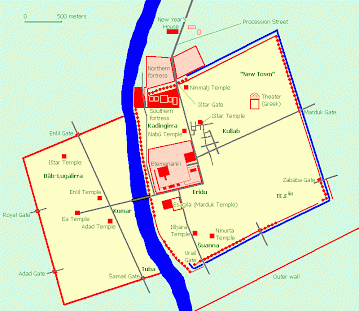Cyrus the Great - Livius (original) (raw)
Babylon
In October 539 BCE, the Persian king Cyrus took Babylon, the ancient capital of an oriental empire covering modern Iraq, Syria, Lebanon, and Israel. In a broader sense, Babylon was the ancient world's capital of scholarship and science. The subject provinces soon recognized Cyrus as their legitimate ruler. Since he was already lord of peripheral regions in modern Turkey and Iran (and Afghanistan?), it is not exaggerated to say that the conquest of Babylonia meant the birth of a true world empire.
The Achaemenid empire was to last for more than two centuries, until it was divided by the successors of the Macedonian king Alexander the Great. A remarkable aspect of the capture of Babylon is the fact that Cyrus allowed the Jews (who were exiled in Babylonia) to return home.
Several texts describe this event, and they are all collected on these pages. Here they are, including brief summaries.
| The Chronicle of Nabonidus gives contemporary information about the rise of Cyrus and the erratic behavior of the Babylonian king Nabonidus, who leaves Babylon and spends several years in the oasis Tayma in Arabia. His son Bêlsharusur (the biblical Belshazzar) acts as regent but is unable to ward off the approaching Persian danger. Finally, Nabonidus returns and fights. But it is in vain; Cyrus is welcomed as representative of the supreme god. |
|---|
| The Verse account of Nabonidus is a poem by one of the priests of the Esagila, the temple of the Babylonian supreme god Marduk. It shows that the religious establishment of Babylon was upset because the important New Year's festival (Akitu) had not been celebrated in Nabonidus' absence. The author of this libel does little to hide his contempt for the impious madman. |
| The Biblical prophet Isaiah (or Second Isaiah, to be precise) tells more or less the same story as the Cyrus Cylinder. Again, tthe Persian ruler is chosen by a supreme god (the God of the Jews, this time) and after winning a victory, Cyrus allows the Jews to go back home. |
| The Cyrus Cylinder presents the new king as the one chosen by the supreme god to liberate Babylon from tyranny. We may speculate that Cyrus considered himself to be on a divine mission under guidance of Ahuramazda, and we can assume that the Babylonian clerk who wrote down this text changed this into Marduk, the name of his own supreme god. Cyrus also boasts that he has liberated many people who were exiled to Babylon. |
| The Biblical prophet Ezra quotes us the probably authentic text of Cyrus' decree on the exiled Jews. |
| The Greek researcher Herodotus finally, has a very unreliable story about the Fall of Babylon. |
| The Biblical prophet Daniel tells about the madness of another king of Babylonia, Nebuchadnezzar. There are several details in this story that make it plausible that the original story was about Nabonidus. Reconstruction of this original is possible through comparison with the text known as the Prayer of Nabonidus. |
